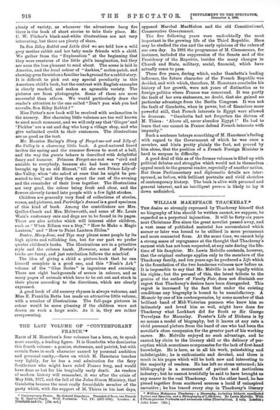THE LAST VOLUME OF " CONTEMPORARY FRANCE."' EACH of M.
Hanotaux's four volumes has a hero, or, to speak more exactly, a leading figure. It is Gambetta who dominates this fourth volume : a genius, statesman, and patriot, but with certain flaws in each character caused by personal ambition and personal vanity,—flaws on which M. Hanotaux touches very lightly, for he has a real admiration for the fiery Southerner who might have ruled France long, and would have done so but for his tragically early death. As readers of modern history will remember, it was after the crisis of May 16th, 1877, and the fall of the Jules Simon Ministry, that Gambetta became the most really formidable member of the party which, with the support of M. Thiers in his last days,
• Contemporary France. By Gabriel Hanotanx. Translated from the French by E. Sparvel-Dayly. With Portraits. Vol. IV. 11877-1E52). London A. Constable and Co. 1.150. net.]
opposed Marshal MacMahon and the old Constitutional, Conservative Government.
The five following years were undoubtedly the most important in the growing life of the Third Republic. Here may be studied the rise and the early opinions of the rulers of our own day. In 1881 the programme of M. Clemenceau, for instance, included the suppression of the Senate and of the Presidency of the Republic, besides the many changes in Church and State, military, social, financial, which have actually come to pass.
These five years, during which, under Gambetta's leading influence, the future character of the French Republic was decided, and with which, therefore, M. Hanotaux concludes his history of her growth, were not years of distinction as to foreign politics where France was concerned. It was partly the fault of her own statesmen, no doubt, that she gained no particular advantage from the Berlin Congress. It was not the fault of Gambetta, when in power, but of financiers more powerful still, that French interests in Egypt were allowed to decrease. "Gambetta had not forgotten the dictum of M. Thiers : ' Above all, never abandon Egypt I ' He had to learn that one cannot in France defend French interests with impunity."
Such a sentence betrays something of M. Hanotaun's feeling with regard to the Government of which he was once a member, and hints pretty plainly the fact, not proved by him alone, that the position of a French Foreign Minister is hard to surpass in difficulty.
A good deal of this as of the former volumes is filled up with political debates and struggles which would not in themselves appeal much to the general reader, especially of another nation. But these Parliamentary and diplomatic details are inter- spersed, as before, with brilliant portraits and vivid sketches of contemporary history. The book is alive with personal and general interest, and no intelligent person is likely to lay it down unfinished.






































































 Previous page
Previous page